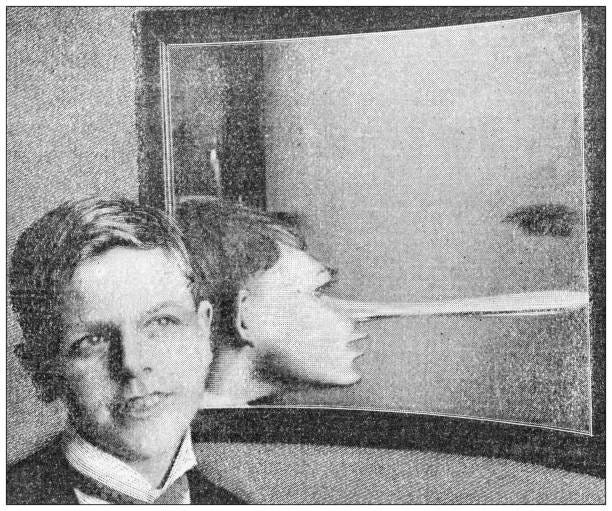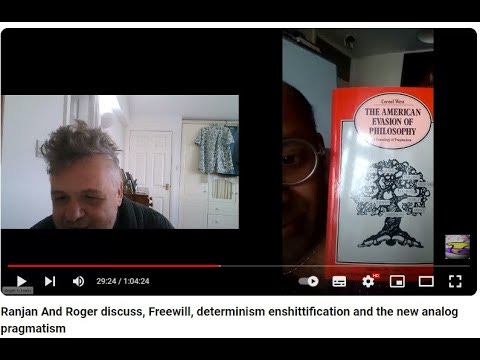Perhaps you'd
prefer to hear my little poem,
The Oyster.by Eimar O’Duffy
'The sun was shining brightly
Upon the fields below:
He did his very best to make
The corn and fruit to grow;
And that was wrong because it brings
The prices down, you know.
The corn was ripening in the fields,
The fruit upon the tree;
The shops were full, and laden ships
Were sailing on the sea:
All things had a fictitious look
Of fair prosperity; .
And that was wrong because the world
Was ruined utterly.
The Banker and Economist
Were walking hand in hand.
They wept like anything to see
Such plenty in the land.
"If this were only stopped" they said,
"The prospect would be grand I"
"If seven pests or seven plagues
Were loosened every year,
I think" said the Economist
"That things would then be dear."
"I wonder" said the Banker,
And wiped away a tear.
"Consumer, come and walk with us"
They both did make request.
"The time has come to tell you what
We think for you is best."
"O thank you" the Consumer said
With lively interest.
"And first" said the Economist
"It's needful to explain
The economic laws which prove
That trade must wax and wane,
And why abundance is a curse,
And scarcity a gain."
"But not to me" the man replied,
. Turning a little white.
"Such dismal scientific stuff
Would stupefy me quite.
I'll take it all on trust because
I know you must be right."
Two winking eyes behind the back
Of that Consumer met,
As if to say: "This blessed boob
Has asked for what he'll get."
"Old chap" said the Economist,
"Your trust you won't regret.
"This gross abundance that you see
Before your hungry eyes
Has ruined all the :primary
Producing industries:
And so, to set things right again,
We must economise.
"And first we'll make a cut in costs
By cuttin~ down your screw,
And next we ll cut production down
Till prices rise anew.
Then, though you'll have less goods to buy,
More work you'll have to do."
"Right ohl" the good Consumer said
(A sturdy Briton he),
And, smiling bravely, yielded up
His share of L.S.D.
By such contraction wages show
Their elasticity.
"It seems a shame" the Banker said
"To play him such a prank."
With sobs and tears he cancelled out
A credit at the bank:
And that was right, unless you are
A monetary crank.
"Consumer" said that pleasant pair,
"We've had a useful day.
Shall we be trotting home again?"
But nothing did he say:
And that was right enough because
He'd faded quite away.'
This is the prayer of Bish Bargold:
'O God who made all things, in the name of Goshawk I beg to humbly draw thy attention to an Asses in Clover error in thy creation, in which, despite our prayers and entreaties, thou still persistest.
Lord, thou hast made Nature over-bountiful in her fruits, so that she yieldeth much in return for little toil, thereby upsetting our magnificent financial system, and casting people out of employment into starvation.
Therefore we beseech thee, render our soil less fertile, our seed less potent, our labours more onerous, and their return less abundant. Send us less rain and less sunshine (except, of course, at fashionable resorts), more storms and more snow. Put forth thy creative power, and endow us with bigger and better pests, with more voracious rats and locusts.
Stultify the brains of our scientists, we implore thee, that they may be less ingenious in invention. And above all things reduce our population that there may be work for all. 'In the councils of High Finance, in their efforts to cope with the present crisis: hallowed be thy name.
'In the hearts of the people, that they may cheerfully accept the burdens and sacrifices that Finance may require of them: thy kingdom come.
'In the policy of High Finance for the restoration of public credit: thy will be done. 'By the general increase of exports and surcease of imports, and by the restoration of public confidence in our magnificent economic system (not, let me repeat, by a bountiful harvest): give us this day our daily bread.
'Because the lower orders have indulged in luxury and sloth, content to draw doles instead of working; because they have been froward and discontented
The Travels of Cuanduine with our magnificent economic system: forgive them their trespasses. 'Lest we disregard the inexorable laws of political economy: lead us not into temptation. 'Because our magnificent economic system is showing signs of breaking down : deliver us from evil.
'From discontent and envy
'From the blight of leisure
'From the curse of plenty
'From unsound financial policies
'From the abomination of inflation
'From unprincipled agitators
'From theorists and dreamers
'From Utopian quackery
Good Lord deliver us.
'From all sorts of currency cranks
'God bless the Bank of International Settlements
for ever and ever, Amen.'
CHAPTER XVIII
Cuanduine dips into ~he Literature of the Period
T HE same evening, Cuanduine, strolling
about the city, went into a bookshop, and,
having browsed around for a while, picked
up a volume of poetry. The first poem in it was called
Spring Song, and ran thus:
'Cuckoo!
Red is blue,
Fire is cold and water dry.
But why
Should I try
To cramp my utterance with the conventions of
rime and rythm?
My soul (if any) is impatient of all such limitations.
'01
Let me be free of all rules and traditions.
I will sound a dozen notes together in glorious
dissonance.
Thus, and thus only, can the multitudinous
motions of my modern mind
Show.
'Ugliness is the only beauty;
Filth the only fair;
Nonsense the only sense;
Discord the only harmony.
112.
The Travels of Cuanduine
I seek an ideology for the disintegration of the
Unconscious.
I seek the synthesis of the artistic monad.
I will paint the gamut of sound, and twang all
colours on my lyre,
And words shall mean exactly what I want them to,
Neither more nor less.'
Not much caring what the poet should want his
words to mean, Cuanduine laid down the book and
took up another, entitled 'experlment,' which
opened at the poem here set down:
Nocturne.
'In the warkood
the t-t-t-t-trees
billwillowed boomcrashingly
in twombish niagaring.
mooninesslessness morribled the skoo, where
scumbled the dunbellied saurianclouds.
vastarkishness prevaricailed.
'But but but she came luxiferous
through through the windroar,
his wait she happinessed.
they wert wast him art she I is but you was
mine thine us,
clingwhispered she jellytremulous.
what and what which
and and and and and and and and.'
'What language is this?' asked Cuanduine of the
bookseller, who had come up expectantly.
I IJ I
Asses in Clover
'The New Language, sir' explained the bookseller. 'Our modern poets have found that no
existing language is expressive enough to--er--express their meaning, so they've invented one of their
own. Of course it's still in the transitional stage, but
some of them get marvellous effects with it. That one
in your hand sir, is considered one of their masterpieces.'
'Can you explain it to me?' asked Cuanduine.
'I'll try, sir. You must understand that the poet
does not use words for their meaning, but for their emotive resonance. He treats language as a piano,
not as a dictionary-twists words about to make
them more significant, runs them together so as to
blend their meaning, uses prepositions and conjunctions freely-much as a composer uses drumtaps, and
cuts loose from syntax altogether. Just look at the
poem before you, for instance. Note the effect of
bewildered emotion produced by that marvellous
line of monosyllables near the end, and the passionate
questioning of that "and and and.'' '
'What does "warkood" mean?' asked Cuanduine.
'"Dark wood," of course.'
'And why write "t-t-t-trees?" Does the poet
stammer?'
'O no, sir. That's to show what a lot of trees there
were in the wood.'
"Tis marvellous ingenious' said Cuanduine. 'I
suppose "mooninesslessness" means "absence of
moon?"'
'Exactly. And "morribled the skoo" means "made
horrible the gloomy sky.'' But the most ingenious
word of all is that "prevaricailed." It's a mixture of
"prevailed" and "prevaricated," implying that the darkness was omnipotent and deceptive.-But perhaps you don't care for poetry, sir.
CHAPTER II
The Machinations of Mr Slawmy Gander
I T was one of the strong points of the character of
Mr Slawmy Cander that he knew how to make
the best of a bad job. It was another, that he cared
not two pins what the world did so long as he
had the management of it. He had created the credits
by which King Goshawk had purchased the songbirds, and he was equally ready to create the credits
by which they should be restored.
Now the power of Mr Slawmy Cander was
founded in this manner: and may you all be sick of
the mulligrubs with eating chopped hay, according
to Master Rabelais' malediction, if you do not now
listen with all your ears. This god-forsaken scrivener
of Mammon, this joyless quill driver of Plutus, was
not, as you might imagine, a direct creation of the
Evil One, but was begotten by a father, Mr
Sweedle Cander, and had likewise a grandfather,
M.r Crawley Cander, and a great-grandfather, Mr
Ikey Cander. This last, in the ancient times, having
neither the will nor the ability to make anything
worth making or do anything worth doing, joined
him with seven others nearly as bad as himself, and
set up a bank. To this institution came sundry
honest men, makers of bread, boots, bricks, books,
and other good things, to place their hard-earned
money in its care. Between them they lodged, let us
say, £1,000; ten of them depositing £100 each.
233
.Asses in Clover
Now all these gentlemen had business with one
another, and found it convenient to pay one another
by cheque. This was even more convenient for Mr
Cander; for he discovered presently that only onetenth of his business was transacted in cash, the
rest being merely clerical work: that is to say, a
payment by Mr Green, a hootmaker, to Mr
Brown, a tanner, was carried out simply by transferring a figure from one ledger to another. Mr
Cander thus realised that most of his cash (or rather,
theirs) would never be wanted by the depositors,
and was free to play certain little tricks with it, by
which, from their exceeding greenness, they were
all to he done brown, as you shall see.
One day Mr Green received a large order for
hoots. To fulfil it he had to pay out, in wages and
other expenses, more money than he had at command; so he approached Mr Cander with a request
for an overdraft. Mr Cander graciously consented,
and allowed him to draw £I oo in addition to his
own money, making £200 in all, on condition that
he should repar £102 in three months' time. Mr
Green fondly imagined that the money he was
borrowing was a portion of that deposited with Mr
Cander by his other clients: hut Mr Cander
clearly perceived that that would he a· poor way of
doing business. Knowing that Mr Green would pay
out most of his overdraft in the form of a cheque
to Mr Brown for leather, he opined that it was
altogether unnecessary to lend him any real money
at afl. Nothing more was needed than to write down
the figure £I oo opposite his name in the ledger,
and, when the cheque came in, to transfer it to the
234
Tlze Passing of Cuantluine
ledger of Mr Brown. By this process none of the
other customers had his deposit reduced by a penny.
Each of them was still credited with £I oo, which he
was entitled to draw if he liked, though Mr Cander
well knew he would not. Thus, instead of reducing
his cash in hand to £900, Mr Cander increased his
liabilities to £ 1, 1 oo. By a stroke of the pen he had
created £100 out of nothing. In one moment this
black-coated totter of figures had become a god.
No sooner was Mr Green granted his overdraft
than he gave an order for leather to Mr Brown, who
now found himself in need of accommodation in his
turn. For you must note that at this time, owing to
the inventions of men of science, the productivity
of industry was increasing so rapidly that the supply
of real money, based on sterile gold, could not keep
pace with it. Mr Brown, therefore, was also driven
to make application to Mr Cander, who created
another £I oo for him in the same way. In like
manner he dealt with others of his clients, as the
need arose, until discretion counselled him to stop.
Now open your ears wider still, and may you be
tormented with wind from eating burnt wheat if you
skip a line of what's coming. In order to repay this
'loan' and the £2 interest on it, Mr Green had to
increase the price of his goods by £ 102, which in
due course he handed over to Mr Cander, who,
after puttjng the £ 2 in his pocket as profit, set the
£ 1 oo of real money received from Mr Green against
the £ 1 oo of sham money created three months ago,
and cancelled both out. Thus there were now £100
worth of boots in the world which nobody, not even
Mr Cander himself, had the money to buy; and when,
2 35
Asses in Clover
in due course, the other loans were also called in,
there were more shop-loads of bread and shirts and
things in the same predicament.
In this way Mt Cander used poor Mr Green and
the rest as so many sponges to suck up money both
from their workers and the public, and then squeezed
them dry; and that is the reason why none of us
ever ~as enough money in his pockets to buy the
good things that the shop-keepers are so anxious to
sell. Do you understand it now, my friends?-the
dismal science, ha! hal Isn't it a rare joke to enjoy
over the coffee you can't afford while they are burning it like weeds on the plantations?
Asses in Clover 'For the Children of the Earth'
The Impending Economic Crisis: A Closer Look at the Fundamental Problems. It’s the accounting system, not the economy stupid.
https://therealslog.com/2023/12/24/prague-shooter-ukraine-link-established/?c=1054060#comment-1054060
Crises In Heresy.
Heresies , skeptical uttered things
usually by Heretics not our type
A black living pest attached to a thought.
properly removed by crushing between
the Thumb and forefinger taking care
To rip the offending critter by the root.
As the blood of its misery congeals
I am reminded of a crown of thorns
breaking the skin but not the will
of a Saviour crucified without cause
https://realcurrencies.wordpress.com/?s=usury+hitler
https://www.everand.com/series/712247491/The-Going-Direct-Paradigm-Spring-2024
















